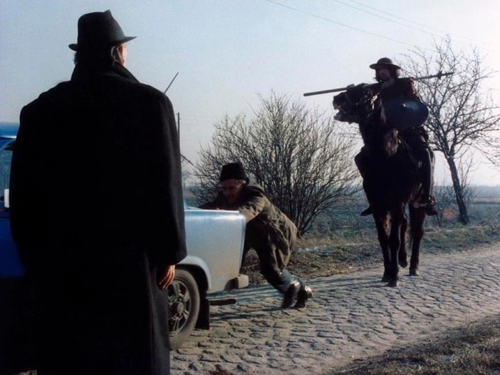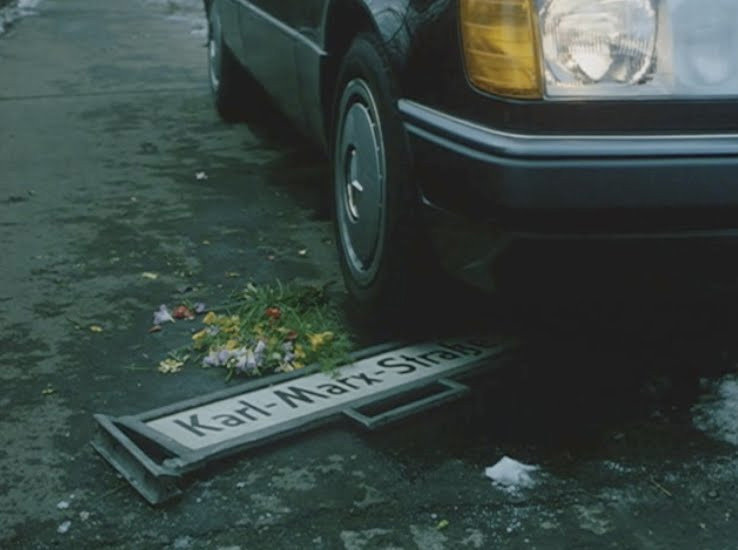
Commissioned by French television to make a film about the state of solitude, Godard chose instead to make a film about the solitude of a state. Shot in 1990, in the wake of the collapse of the Berlin Wall, Allemagne Année 90 Neuf Zéro traces the footsteps of Lemmy Caution (Eddie Constantine in his last performance reprising his Alphaville role) as he makes his way west from East Germany, where he was planted as a mole fifty years ago. Dubbed “the last spy of the Cold War,” Caution is a relic among the ruins of history who encounters a series of bizarre characters including Don Quixote and Delphine de Stael. As he travels through a wintry landscape of mislaid memories, Godard invokes the names of one German past (Bach, Schiller), even as he summons up another past both real and imagined (Hitler, The Damned). Funny, ironic, brilliant and unbearably sad, the voyage is at once a form of radical historiography and resistance. Like Godard, Caution is journeying through a landscape crowded with remembrance, one that finally leads to a Berlin hotel room where a chambermaid fluffs the pillows, smiles bleakly and utters, “Arbeit macht frei.”
Lemmy Caution: “Hey, you! Which way is the West?”1
« Neuf, car c'est tout neuf; zéro, comme le début ou comme le fin, le rien; et 9/0, donc 90, l'année où le film a été commencé. »
Jean-Luc Godard2
“In mid-1989, the producer Nicole Ruellé asked four directors – Jean-Luc Godard, Wim Wenders, Stanley Kubrick, and Ingmar Bergman – to make a film for television on the subject of solitude. Godard accepted, but with a catch. ‘I didn’t want to make a film on a lover’s or a drug addict’s solitude,’ he explained. ‘I rather wanted to concern myself with the solitude of a country, of a state, of a group. I said to myself: why not East Germany?’
For Godard, contemporary Germany was a triple palimpsest. First, for him, it meant German cinema, the ‘haunted screen’ of Murnau and Lang, of Nosferatu and M, of The Last Laugh and Siegfried. Second, it stood for his own youth in the late 1940s and early 1950s, when he first saw those films at the Cinémathèque and the Cinéma-Club du Quartier Latin. Third, it had a personal significance, in relation to his father, who, Godard said, had been a Germanophile and who had introduced him to the literary classics of German romanticism, especially the poetry of Novalis and the novels of Goethe. (...) Even the choice of title made clear that its model was cinematic: Godard rejected the producer’s recommended Solitudes in favor of Allemagne Année 90 neuf zéro (Germany Year 90 Nine Zero), an allusion to Roberto Rossellini’s film Germany Year Zero, filmed in West Germany in 1947, which dramatized the failure of the postwar reconstruction to suppress Nazi ideas and sympathies. (...) The organizing principle of the shooting and editing was to construct a web of references that were at once historical and personal. As a sort of visual punctuation, he used clips of classic German films.
Germany Year 90 Nine Zero would embody history – or, rather, Godard’s view of it. A work of a tendentious grandeur, a diatribe with Olympian airs, Germany Nine Zero took on a monumental aspect akin to that of Nouvelle Vague (1990). Unlike Histoire(s) du cinéma, which offered a historical thesis in terms of Godard’s personal experience, Germany Nine Zero does the opposite: it presents a strong historical thesis – one crucially related to that of the Histoire(s) –but suppresses Godard’s speaking voice and on-screen presence. The dialogue and voice-over commentary, which was spoken by the critic and television director André S. Labarthe (who had played the abandoned husband in Vivre sa vie), was comprised of literary references, mainly from German literature and from writings about Germany (Tacitus, Christopher Isherwood).
But the film’s principal literary reference was to an author whose work had haunted Godard since the 1950s, and whose example had haunted France since 1939: Jean Giraudoux. Though opposed to German occupation and an unreproachable anti-fascist, Giraudoux offered, shortly before the German invasion of France, a scathing indictment of the French national situation, in a book called Pleins Pouvoirs (Full Authority). He decried the growing influence of America and the increasing presence of Jewish refugees from Eastern Europe. Though he expressed no love for Nazi Germany, the principal targets of his diatribe were the same as those of the Nazis. Giraudoux was not a collaborator in deed, but by sharing enemies with the German ideology, he implied that Nazi Germany might hold valuable political lessons for France. In his earlier novel Siegfried et le Limousin (published in 1922), Giraudoux had expressed similar views; this novel, which had loomed in the background of Le Petit Soldat (1963), was central to Germany Nine Zero. The novel’s plot – about a French soldier named Jacques Forestier who, suffering from amnesia, recuperates in Germany and considers himself German – was of secondary significance to the film (though a character from the book, Count von Zelten, played by Hanns Zischler, turns up as Lemmy Caution’s occasional fellow traveler). Rather, Germany Nine Zero is centered on a pair of lengthy quotes taken from Giraudoux’s novel that convey the film’s governing ideas.
As these citations suggest, the real subject of Germany Nine Zero was Godard’s view of three countries, plus a fourth: Germany, the embodiment of the ultimate political sin, the greatest historical transgression, which rendered it taboo among the nations; the United States, which, under its guise of angelic innocence, is guilty of similarly great misdeeds; Russia, which, accused of other grave political crimes, must, as the common enemy of Nazi Germany and the United States, have been doing something right (as, for instance, shielding East Germany from American influence); and, in the shadows, France, which, caught between Germany and the United States, would do better to turn its attention to Russia.”
Richard Brody3
“Germany Year 90 Nine Zero constantly oscillates between two positions: on the one hand, the overwhelming sense (found also in Éloge de l’amour [2001] and Nôtre musique [2004]), that the Past is embedded in the Present, and must be seized (à la Walter Benjamin), or retransmitted, in the sound and vision of representation so as demonstrate these crucial, vital traces; and, on the other hand, this attachment to the notion of a clean break, condensed in the film's evocation of Freud’s famous patient Dora, who had to detach herself (the term is repeated and insisted upon by Godard) from her father, and from the past, in order to break into life.”
Adrian Martin4

- 1Lemmy Caution's recurrent question is borrowed from Jerry Lewis' Which Way to the Front (1970).
- 2Jean-Luc Godard cited in Antoine de Baecque, Godard. Biographie (Paris: Grasset, 2010), 697. Godard seeks a new zero (the doubled meaning of neuf zero in the film’s title).
- 3Richard Brody, Everything is Cinema – The Working Life of Jean-Luc Godard (London: Faber and Faber, 2008), 1571-1592.
- 4Adrian Martin, “Dinosaurs, Babies and the Sound of Music,” Lola, Issue 1: Histories, August 2011.

